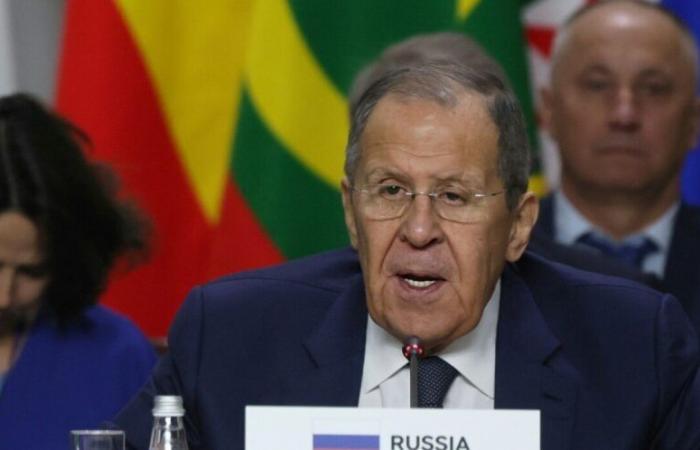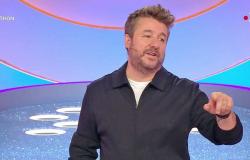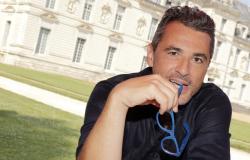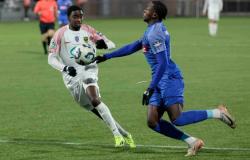For several years, Moscow, which was a major player in Africa during the Soviet era, has been pushing its pawns in African countries, which have not joined the Western sanctions taken against Russia after its attack in Ukraine in February 2022.
“Our country will continue to provide its full support to our African friends in different areas,” assured Russian President Vladimir Putin in an address read on Sunday to senior officials from around fifty African countries, gathered in Sochi for a conference. Russia-Africa ministerial meeting.
“Artificial obstacles”. This could be “sustainable development, the fight against terrorism and extremism, epidemic diseases, the resolution of food problems or the consequences of natural disasters”, according to this message read to the participants by the Minister of Foreign Affairs Sergei Lavrov. “The African continent must be and will be one of the centers of the multipolar world,” said Mr. Lavrov during the closing ceremony of this conference, which follows two Russia-Africa summits in 2019 and 2023.
According to Mr. Lavrov, Russia and African countries see “progress in all axes” of their cooperation, “despite artificial obstacles” opposed by the “collective West”, a term used by Moscow to designate the United States and their allies. He also assured that Russians and Africans consider it “necessary to get rid of dependence on global mechanisms controlled by our Western colleagues”, particularly in the financial field.
This conference comes after the BRICS summit in October in Kazan (Russia), where Vladimir Putin wanted to demonstrate the failure of the policy of isolation and sanctions initiated by the West.
In its strategy of informational influence, particularly on social networks, the Russian government denounces “neocolonialism” in Africa, a rhetoric that resonates with some African leaders.
Members of the delegations attend the Russia-Africa partnership forum at Sirius University in Sochi, Russia, November 10, 2024. – STRINGER – Sochi (AFP)
“Not a colonial power.” “Russia is not a colonial power” and “has never been a colonial power,” assured Saturday the head of Malian diplomacy, Abdoulaye Diop, on the sidelines of the Russia-Africa conference. “On the contrary, she stood alongside African people and other peoples around the world to help them escape the colonial system,” he maintained.
Many Western officials accuse Moscow of leading a conflict of an imperialist nature in Ukraine, a former Soviet republic.
In Africa, groups of Russian mercenaries like Wagner, or its successor Africa Corps, support local authorities, and “advisers”, according to Moscow, work with officials. This is particularly the case in the Central African Republic and the Sahel where the growing influence of Russia has been accompanied by the meteoric decline of that of France.
Raw materials. In 2023, Moscow also delivered more than $5 billion worth of arms to the African continent (4.7 billion euros), according to the Russian public company Rosoboronexport. But, for the officials gathered in Sochi, support must go beyond security issues.
“We must develop digital technology, digital technology in Central Africa”, with support from Russia in these areas, Marie Thérèse Chantal Ngakono, commissioner for regional planning and infrastructure at the Economic Community of Africa, told AFP. Central African States (ECCAS).
Large Russian groups are also closely interested in African raw materials: Alrosa in Angola and Zimbabwe (diamonds); Lukoil in Nigeria, Ghana, Cameroon and the Republic of Congo (oil); Rusal in Guinea (bauxite)…
Circumstantial interest? “We have more than 75 minerals in Africa. And they are not used well,” Young Piero Omatsaye, founder of the Jet Age Nation Builders organization aimed at promoting the advancement of the African continent, told AFP.
“Thanks to a partnership with Russia”, one of the largest exporters of gas, oil and diamonds, “we will be able to use these resources well”, estimated this Nigerian politician.
For Bakary Sambé, director of the Timbuktu Institute in Dakar, interviewed this week by AFP, the question of a long-term partnership nevertheless arises: “Would Russia grant the same interest to Africa if the war in Ukraine was ending? », Is it a “real strategic priority” or a temporary interest linked to its standoff with the West?
© Agence France-Presse






